41 snake organ diagram
vomeronasal organ. (Jacobson's organ); unique sensory struct in snakes which has paired openings in roof of mouth. Describe how snakes smell and detect other things. -Snakes have a vomeronasal organ (Jacobson's organ). As forked tongue flicks, scent molecules are picked up on each fork and deposited into separate openings of vomeronasal organ. The organ has two ducts that reach down to the roof of the snake's mouth. The snake sends out his forked tongue and some of the moisture-laden smell particles lands on the tips of the fork. Then, the snake flicks its tongue back inside where the tips of its forked tongue can be dipped into the ducts from the Jacobson organ.
Chart: Snake anatomy. A crisp, higher resolution of this graphic is contained on Australia's Reptiles CDROM.. This site maintained by Mark F. Miller, webmaster at herpetology.com. BACK ßß
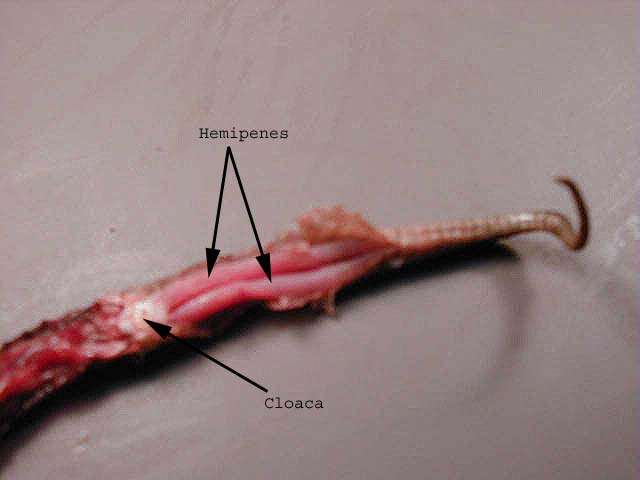
Snake organ diagram
For example, a ball python 2 or 3 feet long may have a tail only 3 inches or so long. That's a bit on the extreme end, but it's not at all unusual to find snakes with tails that make up only a fraction of their body length. Compare with glass snakes/lizards, which have tails that can be very long, proportionally. 4. level 1. sagan_drinks_cosmos. snake - snake - Form and function: The most characteristic aspect of the snake form is the elongate body and tail and the absence of limbs. There is no snake in which the limb remnants still retain a function in locomotion, but complete or reduced elements of the pelvis and femur remain in many snake families, including the boa and python families. This organ isn't found only in snakes, as it is also found in other lizards, some salamanders and many mammals. The vomeronasal organ is used to detect non-volatile chemical substances (which need direct contact with the epithelium to be detected) such as pheromones or the scent of a prey. Scheme of the position of the vomeronasal organ.
Snake organ diagram. Snakes have four basic methods of movement: Advertisement. Serpentine - This S-shape movement, also known as undulatory locomotion, is used by most snakes on land and in water. Starting at the neck, a snake contracts its muscles, thrusting its body from side to side, creating a series of curves. The muscles of snakes are as the skull and jaw bones of poisonous snakes are very flexible. In cobras, the fangs are permanently erect. But in vipers, the large fangs found against the roof of mouth when closed. Mechanism for biting give two main reasons; A. erection of fangs and B. injection of poison into the victim's body. The vomeronasal organ (VNO), or Jacobson's organ, is the paired auxiliary olfactory (smell) sense organ located in the soft tissue of the nasal septum, in the nasal cavity just above the roof of the mouth (the hard palate).The name is derived from the fact that it lies adjacent to the unpaired vomer bone (from Latin vomer 'plowshare', for its shape) in the nasal septum. The copulatory organs of male snakes are pretty amazing. As mentioned, they are called hemipenes and snakes and lizards both have two of them. On snakes, they are found in the base of the tail. They are normally hidden, until the males are sexually aroused. When they get aroused, the hemipenes become 'everted' and emerge from the cloaca.
Summary. If a man and a woman want to reproduce sexually, they have to engage in sexual intercourse. This involves placing the man's erect penis into the woman's vagina. The vagina rubs and puts pressure on the penis, which makes the man have an orgasm.During his orgasm the man ejaculates, and his semen flows into the woman.If a sperm in the semen reaches the woman's Fallopian tubes and fuses ... A line diagram from The Fauna of British India by G. A. Boulenger (1890), ... The wave speed is precisely the same as the snake speed, and as a result, every point on the snake's body follows the path of the point ahead of it, allowing snakes to move through very dense vegetation and small openings. The first snake to successfully wrap his tail around the female and meet at the right point for intercourse to occur gets to mate. Male snakes have a pair of sex organs called hemipenis and these ... Snakes have a long narrow body that can be divided into four quadrants; Major structures of the first quadrant consist of the head, esophagus, heart, and trachea. ... (right). Positions of organs by percent of body length (nose to vent) are represented to the left. This diagram was created by Dr. Paul (Tripp) Stewart and adapted for use in the ...
The snake's body was divided into sections and sent to the museum's special projects lab. For the next 10 months, a colony of dermestid beetles gorged on the remaining dried tissue, resulting in nearly white bones. The sections were then fumigated and returned to the herpetology range to soak in peroxide to loosen any remaining tissue. Scales. Widely considered to be one of the fastest snakes in Africa, black mambas have been clocked travelling at speeds of 11kmph (6.8mph) over short distances, and are able to navigate through ... Snake Anatomy. Snakes belong to the reptile group. They lack the moveable eyelids, limbs, sternums, urinary bladder and ear openings. The body of the snake is so narrow and elongated. So the organs of the snake are also elongated to fit in the body structure. The quadrate bones that connect the skull to the lower jaw are long and flexible. Ovaries. The reptilian ovary consists of follicular cells, epithelial and endothelial cells, nerve tissue and connective tissue in an elastic tunic. The ovaries of snakes are elongate and are located near the pancreas/spleen/gall bladder, cranial to the kidneys. The right ovary is cranial to the left but may overlap. Both ovaries are present.
The pre-designed snake diagram PPT template can work well when covering data or organizational process flow in a streamlined manner. Ideal for use by strategic planners, process managers, brand managers, etc…. Carry your audience along and show the relationship between process and how they flow together. Proudly powered by WordPress.

Corn Snakes The Comprehensive Owner S Guide Companionhouse Books Housing Requirements Feeding Breeding Diseases And Disorders Color And Pattern Variations More The Herpetocultural Library Love Kathy Love Bill 9781882770700 Amazon Com
Those are the major organs and parts. In the second quarter, about 26 to 50 percent of the snake, are the top of the lungs, the liver, and then three-fourths of the ... minute scent particles in the air and place them in direct contact with this organ. In essence, this is how a snake smells. Snakes' teeth line the inner surfaces of the upper ...

Diversity Free Full Text Exquisitely Preserved Fossil Snakes Of Messel Insight Into The Evolution Biogeography Habitat Preferences And Sensory Ecology Of Early Boas Html
Download scientific diagram | The pit organ of the crotaline snake Trimeresurus flavoviridis. (A) Crotaline snakes have a pair of pit organs, which are infrared (IR) receptors, one located on each ...
As compared to other parts of the digestive system of a snake, the large intestine is the least muscular and thin-walled structure. The large intestine ends in the rectum, which, in turn, opens up to the cloaca that leads to the opening outside the body. Everything, except the claws and hair of the prey, is digested by snakes.
Use the diagrams on pg. 9, to locate the veins and arteries listed on page 2. Veins (see diagram page 9) Your rat specimen has been double injected with latex to help you identify veins and arteries. Veins carry used blood (blue) back to the heart and lungs. The lungs re-oxygenate the blood and the heart pumps it back to the rest of the body.
1 of 2. One labeled diagram and one blank diagram for students to complete. reptile body chart snake animal diagram anchor chart. = Member Site Document.
Image of the Snake's organs (focus on number 15): Hormone. In both snakes and frogs, hormones similar to ADH are found. In frogs, a hormone called arginine vasotocin, also known as AVT, controls water retention. In snakes, a similar hormone is found to regulate water retention. However, there is still research being done.
Female snakes lay eggs or give birth to live young 1-2 times per year. However, the most interesting thing to learn is how snakes reproduce. The female will let the male know when she's ready to mate by releasing pheromones (scent/odor) from the skin glands located on her back. Most snakes reproduce sexually, but some reproduce asexually.
fps = pygame.time.Clock () Step 3: Initialize snake position and its size. After initializing snake position, initialize the fruit position randomly anywhere in the defined height and width. By setting direction to RIGHT we ensure that, whenever a user runs the program/game, the snake must move right to the screen.
UML class diagram for Snake game. Close. 15. Posted by 3 years ago. Archived. UML class diagram for Snake game. ... I'd pack the Board with it's Tiles in one package, the Snake with it's body parts in another and make the body parts and the tiles invisible by giving it package visiblity. Still, the body parts and the Tiles are supposed to know ...
The most obvious feature of the snake is its skin, which is made up of scales. These are made of keratin and are cool and dry. They cover and protect the snake's body, retain moisture in the body, and the dorsal (back) scales display color variation to act as camouflage. 2. Flip the snake over to examine the ventral (belly) side. The ventral
This organ isn't found only in snakes, as it is also found in other lizards, some salamanders and many mammals. The vomeronasal organ is used to detect non-volatile chemical substances (which need direct contact with the epithelium to be detected) such as pheromones or the scent of a prey. Scheme of the position of the vomeronasal organ.
snake - snake - Form and function: The most characteristic aspect of the snake form is the elongate body and tail and the absence of limbs. There is no snake in which the limb remnants still retain a function in locomotion, but complete or reduced elements of the pelvis and femur remain in many snake families, including the boa and python families.
For example, a ball python 2 or 3 feet long may have a tail only 3 inches or so long. That's a bit on the extreme end, but it's not at all unusual to find snakes with tails that make up only a fraction of their body length. Compare with glass snakes/lizards, which have tails that can be very long, proportionally. 4. level 1. sagan_drinks_cosmos.

A Model Of The Anterior Esophagus In Snakes With Functional And Developmental Implications Cundall 2014 The Anatomical Record Wiley Online Library








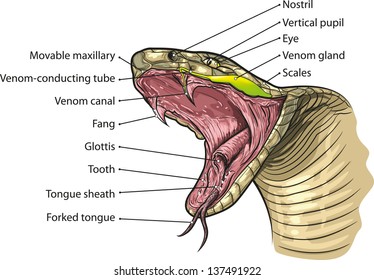

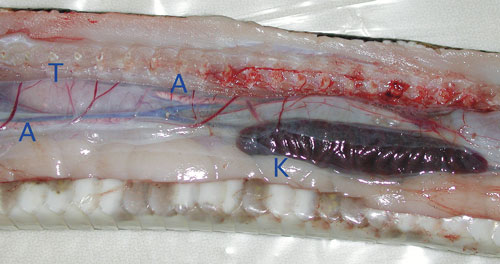


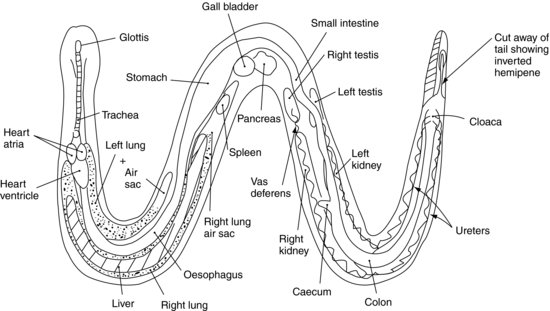





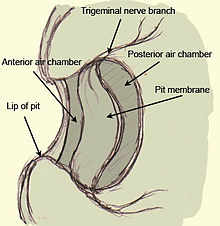



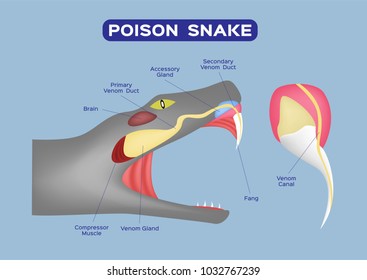




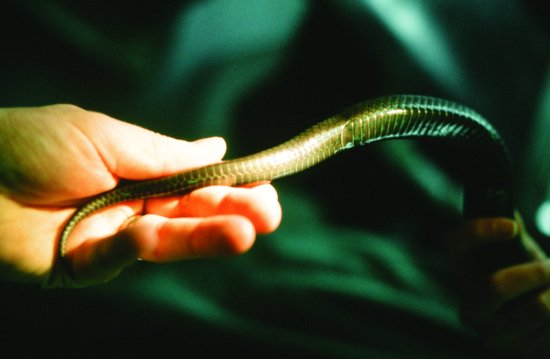


Comments
Post a Comment